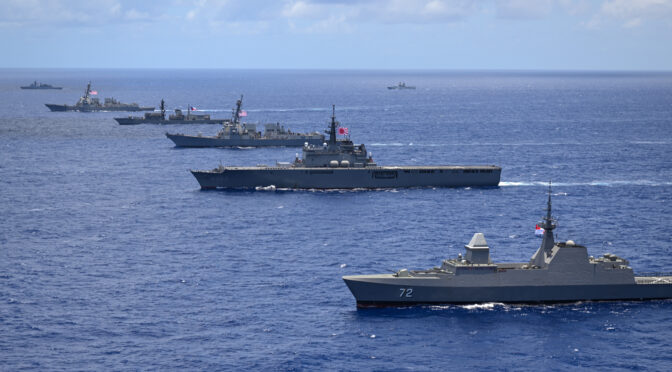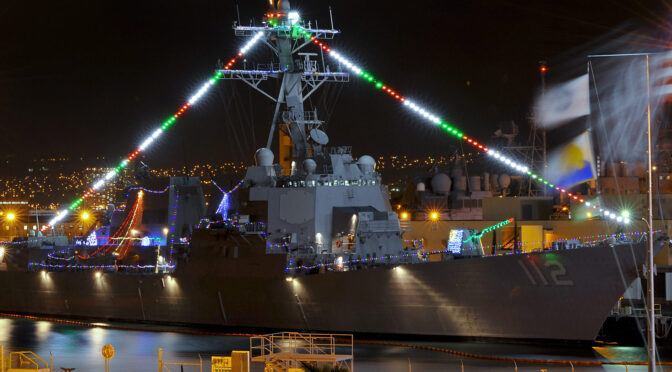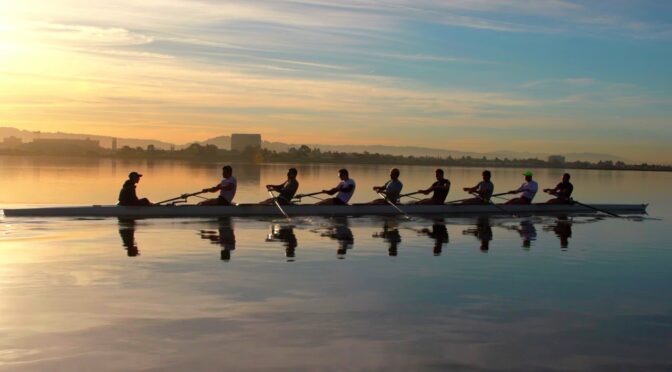By the CIMSEC Team
Happy holidays shipmates! The CIMSEC team has once again put our heads together for what is our fifth annual Holiday Reading List. Below you will find a selection of books we have read and enjoyed over the past year and some that we plan on enjoying in the future, and that we think you might enjoy, too. (Jared even snuck in some other nautical gift ideas.) And of course, we have noted when authors have appeared in CIMSEC or on the Sea Control Podcast. Whether you need to find a book for that special navalist in your life, or if you need something to read on the beach with your toes in the sand or curled up by the fire – we have got you covered. Enjoy, and happy holidays from the CIMSEC team to all our readers and listeners!
If you want even more recommendations, you can find our previous holiday reading list editions from 2020, 2021, 2022, and 2023 here!
Claude Berube
Senior Editor
Into the Deep: A Memoir from the Man Who Found the Titanic by Dr. Robert Ballard
Retired Navy Commander Ballard has earned the moniker of “hero” to many for his incredible career of curiosity and discovery which he recounts in this memoir. While his experiences with Titanic and others made him famous, his questions, hypotheses, and methods of how he found each of the ships are as important as his reinterpretation of history with ancient Mediterranean trade routes as well as reinforcing the ancient flood stories of Noah and Gilgamesh in the Black Sea. He continues to expand humanity’s understanding of the sea floor which anyone can watch on live feeds from his ship E/V Nautilus.
The Wide Wide Sea: Imperial Ambition, First Contact and the Fateful Final Voyage of Captain James Cook by Hampton Sides
Keeping with the theme of exploration, this new treatment of Cook’s life and final voyage dispels common myths and explains his final days.
Path to Power, Means of Ascent, and Master of the Senate by Robert Caro
I’ve only recently gotten around to the first three books on Lyndon Johnson in the proposed five book series in what may well be the best and most comprehensive biographical treatment of any president. The CIMSEC audience, especially officers, may wonder why these recommendations, but there are many historical lessons from the New Deal to the Great Society. Those eventually assigned to the Office of Legislative Affairs may also find it of interest. Of course, there’s also Caro’s treatment of LBJ’s time as a Navy officer during the Second World War. The Audible versions are excellent for those with limited time and a long commute.
Collin Fox
Senior Editor
Dreadnought: Britain, Germany, and the Coming of the Great War by Robert K. Massie
All the Factors of Victory: Admiral Joseph Mason Reeves and the Origins of Carrier Air Power by Thomas Wildenberg
Books like Massie’s and Wildenberg’s illustrate how revolutionary changes in naval technology catalyzed the world wars and transformed war at sea twice over in less than 30 years. A Ticonderoga-class cruiser with equally antique SM-2 Standard missiles remains tactically relevant today despite their 1970’s-era designs, but the thought of a ship designed in 1866 fighting in the Battle of Jutland in 1916 or a weapon from 1892 influencing the Battle of Midway in 1942 is laughable. That scale and pace of change will come again. The best way to create and prepare for it is cultivating a deeper historical understanding with engaging books like these.
Andrew Frame
Sea Control Associate Producer
The Pacific War Trilogy is a three-volume history of the Second World War in the Pacific, written by esteemed author and military historian Ian Toll. These are books measured by the quality of storytelling, attention to detail, and raw word count. Toll joins narrative historians like Nathaniel Philbrick, David McCulloch, and James Bradley in giving us the story as a story, making learning as easy as reading. You can listen to Jared interview Toll about his Pacific Trilogy and his book Six Frigates: The Epic History of the Founding of the U.S. Navy on Sea Control 229.
Pacific Crucible: War at Sea in the Pacific, 1941–1942 is the first volume in the Pacific War trilogy. The book is a narrative history of the opening phase of the Pacific War, which took place in the eastern Pacific between the Allies and the Empire of Japan.
The Conquering Tide: War in the Pacific Islands, 1942–1944 is the second volume, narrating the middle phase in the central and southern Pacific.
Twilight of the Gods: War in the Western Pacific, 1944–1945 is the third and final volume taking place in the western Pacific as the conflict was brought to the Land of the Rising Sun.
Brian Kerg
Sea Control Co-Host
Chinese Amphibious Warfare: Prospects for a Cross-Strait Invasion, edited by Andrew S. Erickson, Conor M. Kennedy, Ryan D. Martinson.
This is the most current and comprehensive study of the operational considerations at play regarding a potential cross-strait attack by the People’s Republic of China against Taiwan. Without a successful amphibious assault, any Chinese invasion of Taiwan will fail – it is the critical piece of the military threat. Naval planners across the Indo-Pacific are laser focused on this exact contingency. This will be essential reading for anyone working on this scenario. Look for a Sea Control episode featuring Andrew Erickson coming soon.
Revolutionary Taiwan by Catherine Lila Chou and Mark Harrison
“Revolutionary Taiwan” is a top-notch exploration of Taiwan’s history across centuries. Too often, observers initiate the heart of cross-strait tensions starting at 1949, when the Kuo Ming Tang fled across the strait to Taiwan at the end of the Chinese Civil War. But the history of this island nation, and the root of today’s political tensions and cross-strait relations with China are far deeper and more complex than that, involving centuries-long struggles against colonization by those Taiwanese who lived on the island prior to the arrival of the Kuo Ming Tong, and their quest for democracy afterwards.
If your work is related to Taiwan or its security, and you want to ensure your analysis is sound regarding where Taiwan is and where it is going – this book is essential.
Walker Mills
Sea Control Co-Host and Senior Editor
The Wide Wide Sea: Imperial Ambition, First Contact and the Fateful Final Voyage of Captain James Cook by Hampton Sides
Sides is a masterful storyteller, and he does his best to chronicle Cook’s whole voyage, and not only the gory ending. He is able to capture subtle changes in Cook’s personality and leadership that likely impacted the voyage. Another testament to this book is that I am not the one to have it on my list. As someone who recently relocated to Hawaii, this book was one of the best I read this year. Jared interviewed Hampton Sides on Sea Control 527.
The Wager: A Tale of Shipwreck, Mutiny and Murder by David Grann
I’m late to the party on this one. The Wager was a #1 New York Times Bestseller last year, and if you haven’t read it yet, do yourself a favor and pick up a copy (or gift it to the special navalist in your life). Grann is at his best and the story is fascinating. It also pairs well with The Wide Wide Sea, and the movie Master and Commander: The Far Side of the World. In the new year I’m planning on keeping my Age of Sail kick going with The Billy Ruffian: The Bellerophon and the Downfall of Napoleon. You can listen to Jared interview Grann on Sea Control 440.
The Pacific’s New Navies: An Ocean, it’s Wars and the Making of US Sea Power by Thomas M. Jamison
Dr. Jamison is a professor at the Naval Postgraduate School and this book (release date 15 January 2025) is based on his PhD dissertation about exchanges in technology and tactics across the Pacific in the 19th Century. I had the pleasure of interviewing him about his thesis on Sea Control 379 and it was fascinating.
Fat Leonard: How One Man Bribed, Bilked and Seduced the U.S. Navy by Craig Whitlock
If you have served in the US Navy, you have heard of ‘Fat Leonard,’ scandal (court cases ongoing) that touched a generation of officers who served in the Pacific. I ordered Whitlock’s book as soon as it came out and I look forward to reading it.
Addison Pellerano
Sea Control Associate Producer
Red Crew: Fighting the War on Drugs with Reagan’s Coast Guard by Jim Howe
A firsthand and action-packed account of the 1980s drug war from the executive officer of a Coast Guard surface-effects ship. It highlights the can-do attitude of the Coast Guard crews who manned the vessels and the missions they embarked on.
Naval Battle of Guadalcanal: Night Action, 13 November 1942 by James W. Grace
The book details a single engagement from the four days of the Battle of Guadalcanal. The author includes perspectives from both the US and Japanese sides and the planning that went into the battle.
Jared Samuelson
Sea Control Executive Producer ‘Emeritus’
I am submitting not a list of books, but rather items to engage the young maritime security enthusiast in your life.
Tom Crestodina’s Working Boats. I recommended this last year, and I’ll include it any time I’m asked to provide input to a reading list. If you grew up enthralled by David Macauley’s Castle, you’ll understand why this is my first choice and, with apologies to Macauley, the illustrations are better. Ten types of working vessels are shown with illustrative cutaways and descriptions. You can find plenty of other options on Tom’s website, The Scow, and feel free to put on Sea Control 431 while you browse.
The shipping container tissue box will show any office visitor that you don’t have to be our good friend Sal Mercogliano to be serious about the importance of merchant shipping. Fair warning: every person who sees this is going to want to play with the remarkably realistic functional door. While I have a Maersk box myself, a better choice might be CMA CGM so you can start a conversation about the role western companies are playing in China’s naval expansion, as detailed in Sea Control 364.
Most LEGO harbor sets have focused on the industrial space dedicated to the loading and offloading of cargo, but the new Seaside Harbor with Cargo Ship is more reminiscent of San Diego’s 10th Avenue Marine Terminal, where most imported bananas enter the United States from colorfully painted Dole company vessels.
Benjamin Van Horrick
Senior Editor
Odysseus & the Oar: Healing After War and Military Service by Adam Magers
What can an ancient myth tell us about reintegrating veterans into modern society and service members preparing for the mental and moral demands of future conflict? In Odysseus and the Oar, Adam Magers couples the ancient tale with Jungian psychological interruption to offer veterans longing to return home – and mental health professionals looking to assist – a framework for their odyssey. Unlike most mental health professionals, for Magers, the work of reintegration was a personal struggle before becoming a professional pursuit. A decorated combat veteran who fought in the Battle of Sadr City, Magers floundered upon reentry to American society, mirroring Odysseus’ epic struggle to return home. Born out of Magers clinical work and close study of the myth, Odysseus and the Oar offers a compelling guide for the treatment and understanding of Post-Traumatic Stress Disorder (PTSD), extracting insights from Odysseus’ epic journey home while preparing future combatants for the convoluted moral space they will enter should hostilities commence again.
Out of Mesopotamia by Salar Abdoh
What occurred during the fight against ISIS in Syria and Iraq? Against the backdrop of fluttering black flags and orange jumpsuits, Salar Abdoh’s novel Out of Mesopotamia uses the conflict to explore age-old themes. He offers an Iranian perspective informed by his time as a war correspondent, giving depth to his narrative while exploring nuances ignored by Western audiences. The novel is not just poignant and darkly funny, but it serves as a meditation on the most vexing aspects of the human experience, topics highlighted by conflict.
Marie Williams
Sea Control Co-Host and Associate Producer
The Contest for the Indian Ocean: And the Making of a New World Order by Darshana Baruah
Scholars have long studied the maritime statecraft of great powers. But in this book, Darshana Baruah studies the statecraft of middle and rising powers, including island states, in the Indian Ocean, and how each builds influence to secure its strategic interests. The result is fresh insight into maritime statecraft and its role in 21st century geopolitics, making this book a a must-read.
American Defense Reform: Lessons from Failure and Success in Navy History by Rear Adm. Dave Oliver, USN (Ret.) and Anand Toprani
This book adds historical sensibility to the debate on Department of Defense modernization. By interrogating the Navy’s acquisition system from postwar to post-Cold War, Rear Adm. Dave Oliver and Anand Toprani show how process, personnel, and priorities got the Navy more capability for less money and offer clear lessons for when they did not. For Sea Control’s episode on American Defense Reform with Rear Adm. Dave Oliver and Anand Toprani, stay tuned in Winter 2025. For CIMSEC’s written interview with both authors, see here.
Dmitry Filipoff
Director of Online Content
Kaigun: Strategy, Tactics, and Technology in the Imperial Japanese Navy, 1887-1941 by David C. Evans and Mark R. Peattie
This classic work on the rise of the Imperial Japanese Navy remains a deeply enlightening look at how a new naval power upset the traditional maritime balance and rose to great power status. It offers a detailed yet comprehensive treatment of the core elements of naval power, including the IJN’s force structure planning, naval strategy, warfighting concepts, and technological progression. The aggressive underdog mentality of the IJN and its steely determination to eclipse western navies offers lessons for grasping the shifts currently underway in Asia.
Delivering Destruction: American Firepower and Amphibious Assault from Tarawa to Iwo Jima by Chris K. Hemler
The WWII island-hopping campaign of the U.S. in the Pacific demanded new, combined arms forms of delivering firepower ashore. While U.S. forces fought their way onto heavily defended beaches and across harrowing island terrain, a remarkable combined system of air, surface, and land-based fire support flexibly bombarded the enemy. As U.S. forces assaulted successive island strongholds and gained valuable combat experience, they steadily sharpened their approach to triphibious fire support. Chris Hemler’s Delivery Destruction is an illuminating analysis of the warfighting development of a capability and doctrine that was fundamental to the U.S. way of war in the Pacific. Read CIMSEC’s interview with Hemler on the book here.
One Hundred Days: The Memoirs of the Falklands Battle Group Commander by Admiral Sandy Woodward and Patrick Robinson
The Falklands War offers an instructive experience for modern naval commanders. In his memoir, Admiral Sandy Woodward provides a deeply personal perspective of the conflict, including combat decision-making, the plans and strategies of the British naval battlegroup, and the mental trials of a task force commander at war. The early days of the Sea Control podcast featured a significant number of episodes with Falklands War veterans sharing their stories, which can be viewed here.
Featured Image: Art created with Midjourney AI.




